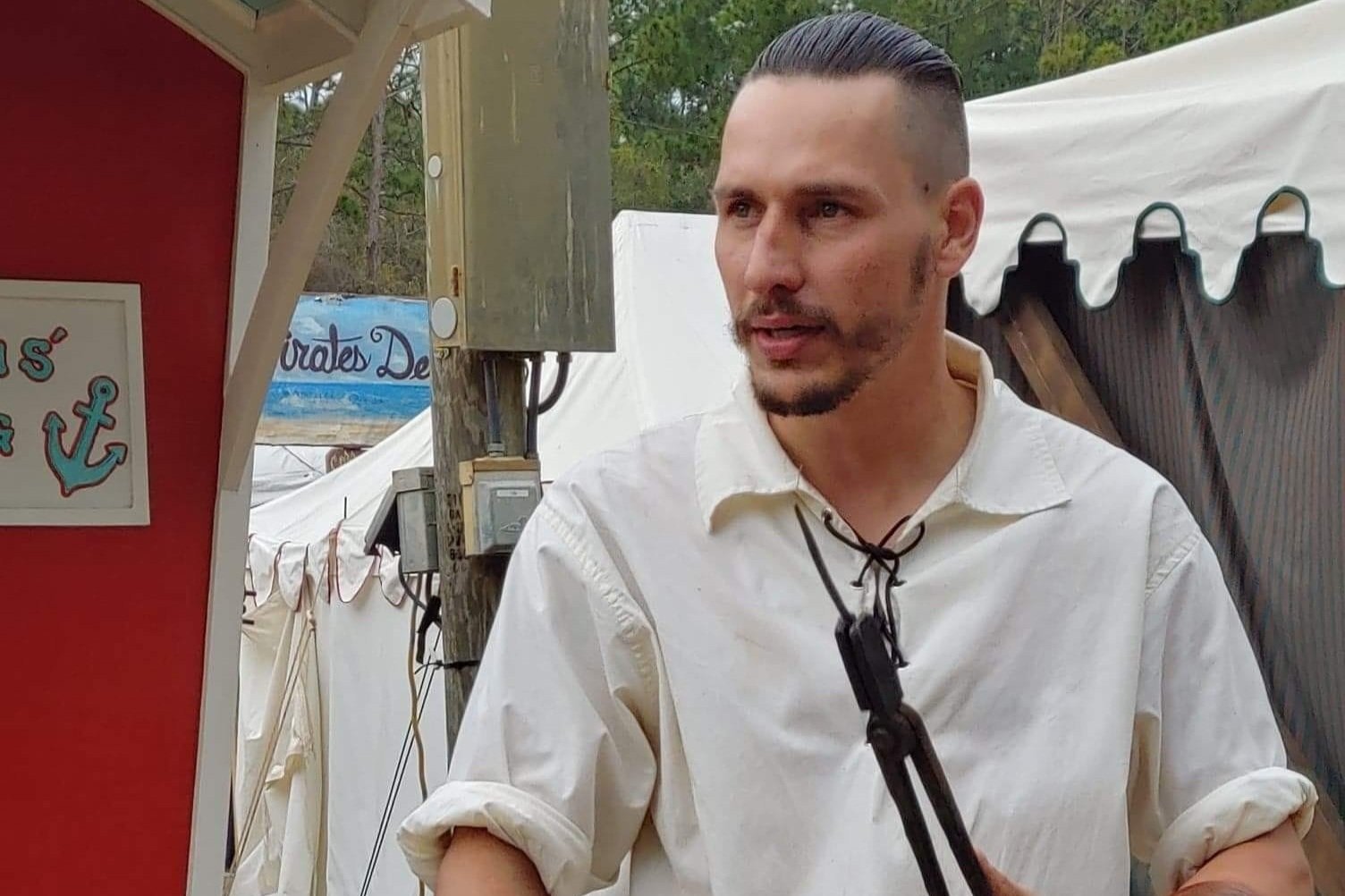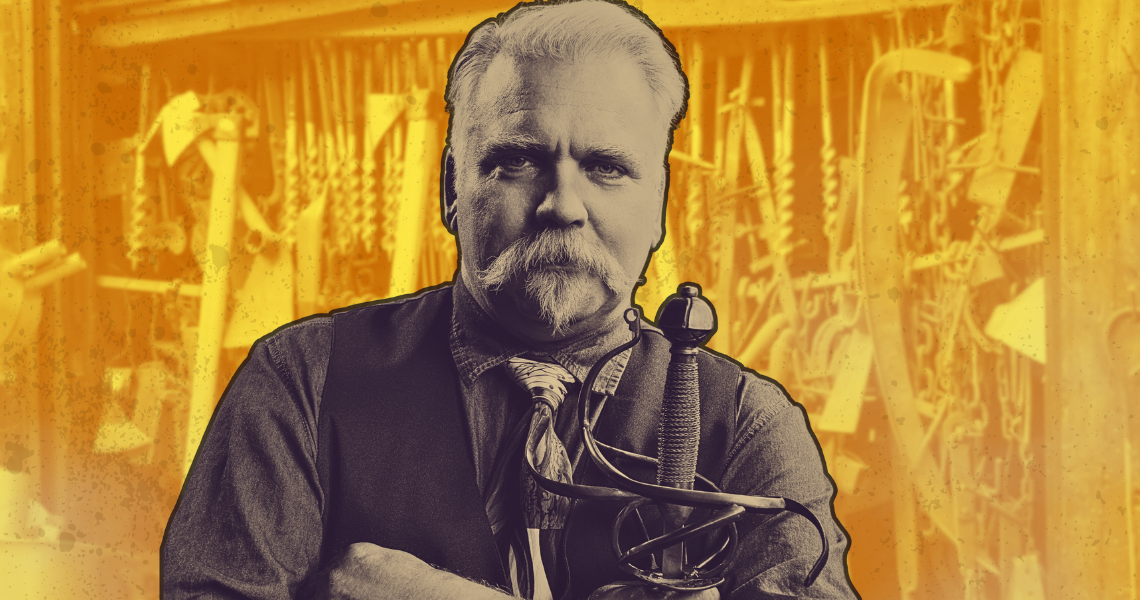Last Blade Standing's Jacob Underhill is Leading a Bladesmithing Renaissance
(Image credit: Jacob Underhill)
Today’s bladesmith interview is presented by our friends at Odenson. Look, we know many of you bladesmiths are sporting some glorious facial hair. But let’s be honest, some of your beards have gotten out of control! Luckily, the team at Odenson has you covered. Head over to Odenson.com to get 35% off their ultimate heated trimmer, the beard forger.
Jacob Underhill is the owner of Underhill’s Forge in Starke, Florida. Initially set to appear as a competitor in season three of Last Blade Standing, he was forced to step away from the competition. Instead, he was lucky enough to appear as a judge in season three, where he got to put each blade through a rigorous round of testing.
RELATED: SEASON FOUR OF LAST BLADE STANDING IS OFFICIAL
Jacob talked to us about how he connected with his mentor, Jordan Borstelmann, his experience as a judge on Last Blade Standing, and what he has been up to lately.
BRUTE de FORGE: How did you get into forging?
Jacob Underhill: I used to spend a lot more time in the woods hunting and fishing—more than I do now. But I could never seem to find a knife that worked for me. I kept breaking them or damaging them. Then about six years ago, I had a buddy who said he knew how to make knives, and I'd always been interested in that, so I went to his house to try it out. It turns out he didn't know how to do it, but I still got a taste for it. After a lot of YouTube and research, I started to teach myself how to forge and make blades. Then, a couple of years later, I met Jordan Borstelmann, and he took me under his wing, and it snowballed from there.
BDF: How did that mentorship come about?
JU: I met him at the Hoggetowne Medieval Fair back in 2019. I had made this really horrible knife, but I was proud of it. I thought it was great! I showed it to Jordan, and he said, “Wow, that looks cool.” He treated it like the macaroni art your kid gives you when they come home from school. He invited me over to the house and showed me how to do it; from that point onward, it just clicked. I have been doing it ever since.
BDF: What is the name of your forge?
JU: I am Underhill’s Forge. It’s just my last name.
BDF: Do you offer classes or anything?
JU: For the most part, I take commissions. I also do a lot of demonstrations here in Florida. I currently have some stuff going on with the Clay County Public Library. I do demonstrations for them where I show up and do blacksmithing, knives, and other things. I talk to everybody and put on a show. I also do the Renaissance Fair.
“At one point or another, everybody’s already done everything. But mine is a mixture of different styles I’ve seen before, all mashed together. ”
BDF: Are you a full-time bladesmith?
JU: No. I work as a plumber for the Department of Corrections from seven to three thirty Monday through Friday. I usually get home from work at about four o'clock and spend most evenings in the shop. Saturdays and Sundays are my big catch-up day.
BDF: Would you say that your work has a unique style?
(Image credit: Jacob Underhill)
JU: Yeah, I think so. I'm really into the camp knives. I would say fantasy camp is my style. I don't see many people doing it quite like me.
I don't want to say it is my own style, though, because it's hard to have a style of knife that is ‘your own.’ At one point or another, everybody's already done everything. But mine is a mixture of different styles I've seen before, all mashed together.
BDF: Do you have a favorite project that you have worked on?
JU: Yeah. Jordan, Andy Zoidberg, and I collaborated on a high-layer Damascus long seax we ended up gifting to David Baker! That was my favorite project to do. It was a multi-bar serpentine pattern Damascus with a wrought-iron and low-layer Damascus billet down the center and a 360-layer maidens hair pattern on the outer bands of the billet. It also had a wrought iron guard and bog oak handle.
BDF: Do you do your own leather work too?
(Image credit: Jacob Underhill)
JU: Yes. I do all the work from the forging to the leather sheath. My wife has also gotten more into leather work. She's an artist, and she’s doing pretty well. I’ve got to give a shout-out to her. She's helped me a lot. She's my biggest fan and always pushes me to do better. She’s also learned the leatherwork, and she does a lot of the handles.
BDF: I'm always curious about the leather work. The sheath is usually the first thing people see. What goes into designing one?
JU: For me, the sheath is the final little piece. It’s the icing on the cake. It’s what says that the project is finished.
“She’s helped me a lot. She’s my biggest fan and always pushes me to do better.”
When I first started, I didn’t make sheaths. I was only giving people the blades, and then they ended up being tossed in a drawer and never used. So, I started learning how to do leather work because it felt like I wasn’t finishing the projects. The sheath is what tells me it’s the finished product.
For the most part, when I make them, I try to follow the flow of the knife. I don't do a lot of the decorative tooling.
BDF: Is that the logo on your shirt?
JU: Yes. It’s an anvil, and this is a set of Bind runes on top that stand for safe travels and protection.
BDF: What inspired the logo?
JU: I've always been into the Norse mythology side of things. We do a lot of Renaissance fairs, and I've always been into the Viking culture. When I first started, my work was more historically accurate and Viking based. I was doing a lot more seaxs and spears. So, it kind of just fell into place to start putting runes blades. I finally decided it was time to sit down and find a set of runes that stood out to me and had meaning behind them while giving a gentle nod towards Jordan’s shop, the Crooked Path since he uses similar runes as his maker's mark.
BDF: You were a judge on Last Blade Standing this past season. Were you involved in seasons one and two as well?
(Image credit: Jacob Underhill)
JU: I wasn't on the first season, but I did a demonstration at the event for the second season. I didn't participate, but I was there demonstrating. Jordan and I had the equipment out, doing some blacksmithing for those who came to the event in Jacksonville. Then we both got introduced as competitors for the third season.
BDF: Did you get involved because of your demonstration, or did you reach out to Matt “Doc” Martin?
JU: My buddy, Big Bill Wise, put in a good word for us. He told me to ask Martin if I could compete, and Martin said sure. The rest is history!
BDF: Were you nervous when you found out it was a sword?
JU: Yeah, that was a little over my head. It was the first sword I ever fully committed to. I've attempted three or four before but quit halfway through the process due to laziness (laughing). For those who don’t know, swords are A LOT of work!
BDF: How was the build for you? Did you hit any snags?
JU: It went pretty smoothly. Unfortunately, I didn't finish the season. I had some other commitments, and I had to back out. I ended up going to Texas to do the ABS introduction to Bladesmithing. But, as far as the build, it went well.
BDF: What do you think is so addicting about forging?
JU: Honestly for me, I was never good at anything. I was okay at things but never excelled. But metalwork itself was one thing that clicked for me. I took welding in high school, and it came pretty naturally. When I started bladesmithing and blacksmithing, it clicked for me. I'm not going to say it was always easy, but I understood it and how it worked.
“I was okay at things but never excelled. But metalwork itself was one thing that clicked for me. ”
I feel accomplished at the end of the day, like I did something that looks good and is worth something.
BDF: Have you learned any life lessons through forging?
JU: Slow down and take your time. No matter how hard or fast you hit the metal, it will only move so much. Just like in life, slow down, take your time, pay attention, and keep trying.
BDF: What have you been up to lately?
JU: I’ve been prepping for the Starke Splash Bash and getting some commissions out of the way that I picked up from the Hoggetowne Fair back in January.
BDF: Would you do season four of Last Blade Standing?
(Image credit: Jacob Underhill)
JU: Yeah, I would like to fully commit again. As I said last year, I had to step back, but it worked out. I got to be a judge instead, so that worked out even better. But I would like to do it again. I want to clear my conscience and get that off my chest.
BDF: How did you enjoy judging?
JU: It was fun. It was a bit cold, but it was fun. It was windy, cold, and overcast that day. I had a good time seeing everybody's blades and the different styles and skill levels. Just seeing the amount of effort everybody put in was amazing.
BDF: If you return as a competitor next time, you can tell me if you prefer judging or competing more.
JU: I can tell you now that it will be competing. For most bladesmiths, that is probably the answer. They would rather compete.
BDF: Do you have any aspirations to be on Forged in Fire?
JU: I've applied twice now, and both times, I was happy that it only went that far. I will tell you I was 100% ready for the competition right up till I clicked submit then immediately thought I was definitely not ready.
BDF: Do you have any advice for aspiring bladesmiths?
JU: For anyone who is starting out, slow down. That's one of the big things. Slow down and make your blades to your best ability. I see many people put three knives out on a weekend when they first start out. I was like that; you think you're the best there ever was. But slow down and try something new. Try to challenge yourself with each knife.
“Slow down and make your blades to your best ability.”
I recommend you take a class for anybody interested in doing it but might be afraid to take the next step. Take a class, and you will learn a lot from it. Before you go and buy all the equipment, you can get a taste of it, use the tools, and see if you enjoy it. Classes do help a lot. You may be having problems with something you can't figure out, and the class can be eye-opening.
To see more from Jacob, follow him on Facebook at Underhill's Forge or Instagram @underhillsforge.
About The Author
More Interviews






















